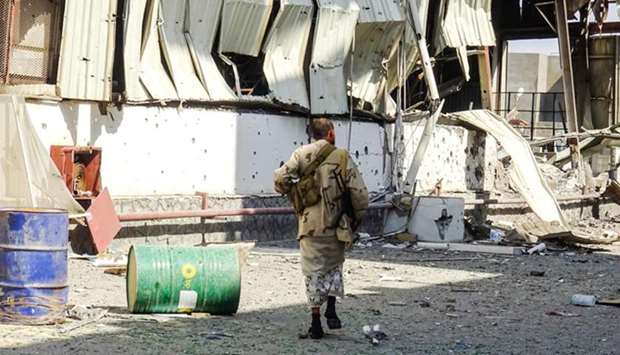Efforts to end Yemen’s devastating war picked up pace yesterday as the government and rebels edged closer to peace talks and Britain led a push at the UN Security Council for an immediate truce.
The moves come ahead of a visit in the next few days to the Arabian Peninsula country by UN envoy Martin Griffiths, who is once again trying to get all sides around the negotiating table.
“The government has informed the UN envoy to Yemen...that it will send a government delegation to the talks with the aim of reaching a political solution,” Yemen’s foreign ministry said, quoted by the official Saba news agency.
Earlier, Mohamed Ali al-Houthi, head of the Houthi rebels’ Higher Revolutionary Committee and an influential political figure, tweeted that he wanted his group to announce “readiness to suspend and halt all military operations” and stop firing missiles on Saudi Arabia.
Saudi Arabia, which is leading a coalition backing the Yemeni government, also lent its support to new talks.
A UN draft resolution on Yemen presented to the Security Council yesterday calls for an immediate truce in the battleground port city of Hodeidah, according to the draft seen by AFP.
The text, circulated by Britain to the 14 other council members, sets a two-week deadline for the warring sides to remove all barriers to humanitarian aid.
The proposed resolution would significantly ratchet up the pressure on the Saudi-led coalition and the Houthi rebels to seek a negotiated settlement in Yemen, where millions are on the brink of starvation.
It also calls for a large injection of foreign currency into the economy through the central back to support Yemen’s collapsing currency and for salaries of civil servants, teachers and health workers to be paid within one month.
The Houthis have controlled Yemen’s capital Sanaa since capturing it in late 2014.
They also still hold Hodeidah, home to a key port on the Red Sea.
The rebels have also fired hundreds of ballistic missiles into neighbouring Saudi Arabia, which has since 2015 has led a military coalition to restore to power President Abd-Rabbu Mansour Hadi’s government.
Residents of Sanaa, interviewed by AFP, welcomed the Houthi call to halt military operations.
“This initiative is not a sign of weakness but a sign of strength to prevent bloodshed and for life to go on,” Mohamed al-Jouri said on the streets of the capital.
Griffiths also hailed the rebel move towards ending missile strikes, saying he “hopes that all parties continue to exercise restraint to create a conducive environment” for talks.
He is expected to visit the Yemeni capital of Sanaa this week to finalise arrangements for peace talks in Sweden, a date for which has not yet been set.
Yesterday, Saudi King Salman told the Shura Council, his country’s top advisory body, that Riyadh also supported a “political solution” and a “comprehensive national dialogue” in Yemen.
Multiple past attempts to hold negotiations between the government alliance and Houthis have failed.
Griffiths said he hoped the rivals would meet in Sweden “within the next few weeks” to seek “an appropriate formula for the involvement of Ansarullah (the Houthis’ movement) and other political parties throughout Yemen in a government of unity”. He told Sky News an agreement had been reached to ensure Houthi delegates could attend the talks without fear of being prevented from returning to Yemen, an obstacle that doomed peace talks slated to take place in Geneva in September.
The Houthis’ foreign minister, Hisham Sharaf Abdallah, met UN officials late Sunday, and was quoted by the rebels’ news agency as saying that the UN and the international community should “adopt the political path to stop the bloodshed”.
British Foreign Secretary Jeremy Hunt arrived yesterday in Iran for the first time to discuss Tehran’s role in Yemen, meeting with his Iranian counterpart Mohamed Javad Zarif.
“We are very, very keen to move towards peace in Yemen. That’s our number one priority at the moment,” Hunt told British television after the talks.
Fighting in Yemen intensified at the start of November as the coalition renewed an offensive aimed at seizing Hodeidah, whose port serves as entry point for nearly all of the country’s imports and humanitarian aid. Pro-government forces announced a pause in their offensive last week as international pressure grew for a ceasefire.

Members of the Yemeni pro-government forces walk through destruction in an industrial district in the eastern outskirts of the port city of Hodeidah, yesterday, during the ongoing battle for control of the city from the Houthi rebels.
